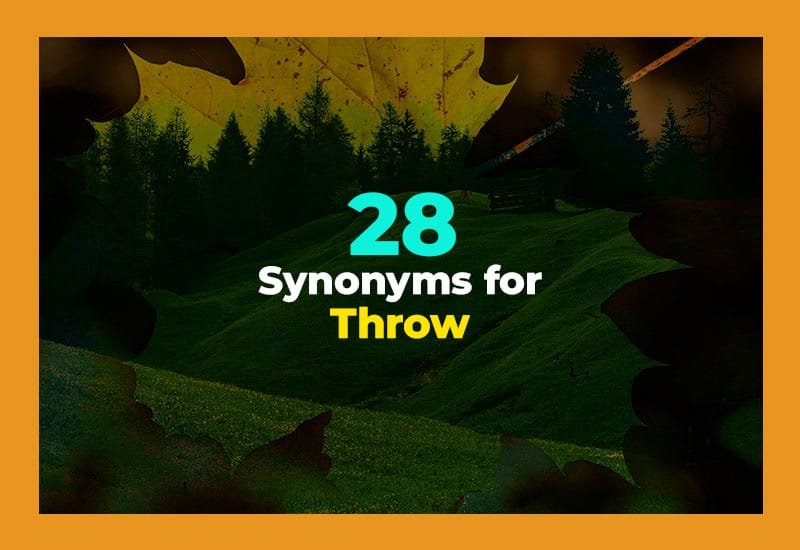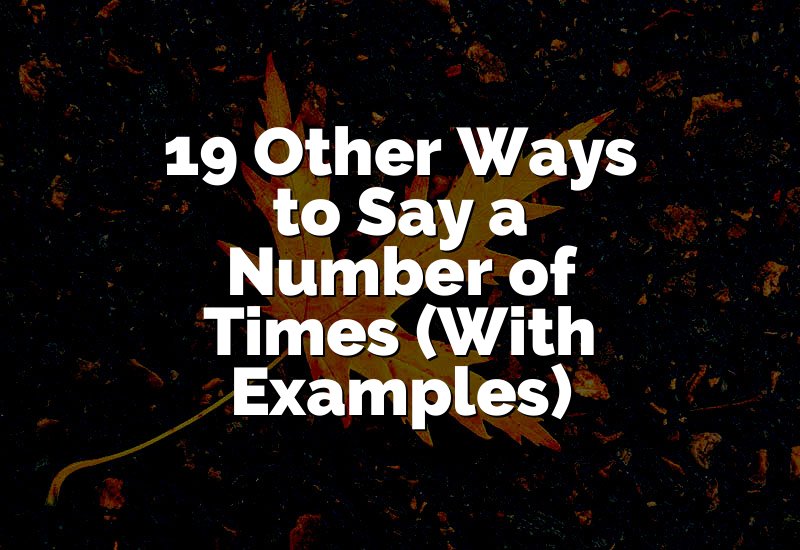You know how sometimes you want to say “throw,” but you feel like using another word instead? Well, you are in the right place. In this article, we are going to look at 28 different and fun ways to say THROW. Words like toss, hurl, fling, or pitch can all add variety. Let’s dive in and explore them together!
| Synonym | Meaning | Example |
|---|---|---|
| Toss | To throw lightly or casually | She tossed the ball to her friend. |
| Hurl | To throw something with great force | He hurled the stone across the yard. |
| Fling | To throw quickly and carelessly | She flung her coat onto the chair. |
| Pitch | To throw something, usually in sports | He pitched the ball straight into the glove. |
| Lob | To throw something in a high arc | She lobbed the ball over the net. |
| Launch | To send something into the air with force | He launched the paper plane across the room. |
| Chuck | To throw something in a quick motion | He chucked his backpack onto the bed. |
| Catapult | To throw with sudden force like a machine | The kids catapulted stones into the water. |
| Sling | To throw using a swinging motion | He slung his jacket over the chair. |
| Cast | To throw something, often for fishing | He cast his fishing line into the river. |
| Heave | To throw with a lot of effort | She heaved the box into the truck. |
| Propel | To push or throw forward with force | The engine propelled the boat across the lake. |
| Shoot | To throw or fire something quickly | He shot the ball straight into the basket. |
| Peg | To throw at something with speed | He pegged the ball at the target. |
| Flip | To throw something by turning it quickly | She flipped the pancake into the air. |
| Roll | To throw gently so it moves along the ground | He rolled the ball to his little brother. |
| Fire | To shoot or throw with power | The cannon fired a heavy ball. |
| Catapulted | To be thrown forward suddenly | He was catapulted out of his seat. |
| Slinging | To throw around carelessly | They were slinging mud at each other. |
| Casted | To throw something outward | He casted the net into the sea. |
| Pelt | To throw many things quickly | The kids pelted snowballs at each other. |
| Propelled | To be pushed or thrown ahead | The skateboard was propelled by his kick. |
| Shy | To throw lightly, often at an angle | He shied a stone into the pond. |
| Hiff | To throw with effort (informal) | He hiffed the football across the field. |
| Skim | To throw so it bounces off a surface | He skimmed the stone across the water. |
| Slinged | To throw something in a swing motion | He slinged the bag onto his shoulder. |
| Pitched | To throw something forward | She pitched the idea along with a ball. |
| Hurled | To throw with force and speed | He hurled his shoe across the room. |
Toss
Toss is often used when something is thrown lightly or without much effort. It can be playful, casual, or even careless depending on the situation. People usually toss things like balls, food, or even clothes. The word feels light and easy, which makes it fun to use in everyday talk. And the best part is, it shows no heavy force, just a gentle throw that gets the job done.
- She tossed the keys onto the table.
- He tossed a coin into the fountain.
- They tossed popcorn into each other’s mouths.
Hurl
Hurl is a strong word that shows a lot of power. It is used when something is thrown with great force or anger. Unlike toss, hurl does not sound gentle at all. It feels sharp and intense. People often hurl stones, insults, or even objects when they are upset. The action is sudden, forceful, and very noticeable. That is why hurl is great when you want to show strong energy.
- He hurled the rock over the fence.
- She hurled her shoe across the room.
- They hurled snowballs during the fight.
Also Read: 26 Other Ways to Say REMIND (With Examples)
Fling
Fling is a fun word because it shows speed and carelessness. It feels like something is thrown quickly without much thinking. You might fling clothes on the bed, fling a bag into a corner, or even fling your arms around someone you missed. It is a lively and expressive word that brings movement into a sentence. The throw is not careful, but it is fast and full of energy.
- She flung her scarf onto the chair.
- He flung open the door.
- They flung the ball back and forth.
Pitch
Pitch is very common in sports, especially baseball. It means to throw the ball toward someone, usually in a game. However, pitch can also mean tossing something forward with some aim. It feels more focused than fling or toss, because pitching often requires a target. You pitch ideas in meetings, but you pitch balls in games. The word feels skillful, sharp, and directed at someone or something.
- He pitched the ball to the catcher.
- She pitched a stone into the lake.
- They pitched their tent near the trees.
Lob
Lob is a slower, higher throw that usually curves through the air. It often happens in sports like tennis or volleyball. A lob feels more gentle than hurl but more controlled than toss. The word describes an action that takes aim but still feels soft. People lob balls, food, or even comments. The sound of the word itself makes it feel light, yet purposeful, like a soft but careful throw.
- She lobbed the ball over the net.
- He lobbed a snowball at his friend.
- They lobbed jokes across the table.
Launch
Launch is a strong and powerful throw, often used when something is sent flying. You can launch rockets, planes, or even paper airplanes. The word makes the throw sound big and exciting. Launch is not a casual word. It shows intention, power, and sometimes even planning. It feels dramatic, like something important is being set into motion. It can be playful or serious depending on the scene.
- He launched the paper plane across the room.
- She launched a stone into the water.
- They launched fireworks into the sky.
Chuck
Chuck is a casual and friendly way to say throw. It is often used in everyday talk. People chuck things like bags, clothes, or even small objects without thinking much about it. The action is quick and light, not very careful, but not too strong either. It has a relaxed tone, which makes it sound fun and informal. Chuck feels like something you do when you are at ease.
- He chucked his jacket onto the chair.
- She chucked the ball to her dog.
- They chucked their bags into the corner.
Catapult
Catapult is not just a word for an old war machine. It can also mean throwing something suddenly and with force. The idea is that the object flies quickly forward, often faster than expected. When something is catapulted, it does not just move slowly—it shoots ahead. This word brings energy and surprise into a sentence. It shows speed, strength, and a sense of sudden release.
- The kids catapulted stones into the pond.
- He catapulted the toy across the room.
- She catapulted forward when the ride started.
Sling
Sling means throwing something with a swinging motion. It can be a bag slung over a shoulder or even an object slung across a room. The action feels casual but a little forceful. It has a sense of motion, as if something is hanging and then moving quickly. Sling can be used for objects, clothing, or even attitudes. It shows a mix of ease and quickness.
- He slung his bag across the chair.
- She slung her coat over her arm.
- They slung stones into the river.
Cast
Cast is often used in fishing when someone throws a line into the water. But it can also mean to throw anything outward, whether an object or even a look. Cast feels intentional and controlled, unlike fling or chuck. It carries an old but elegant tone. The throw is done with a purpose, and it often feels graceful. It works well for both real objects and ideas.
- He cast his fishing line into the lake.
- She cast a glance across the room.
- They cast stones into the sea.
Heave
Heave is a heavy word. It shows effort, struggle, and strength. When someone heaves something, it usually takes energy. The throw is not quick or easy but strong and often tiring. People heave boxes, bags, or anything heavy. The action feels powerful and slow, but it also shows determination. Heave is perfect for big or weighty things that cannot just be tossed or flung.
- She heaved the box into the van.
- He heaved the bag across the yard.
- They heaved stones into the water.
Propel
Propel is when something is pushed or thrown forward with force. It often feels mechanical or strong, like engines or machines pushing things ahead. But people can propel objects too. The word gives a sense of energy, power, and forward movement. Propel does not sound light or casual. Instead, it sounds like something serious or fast. It often describes actions where motion keeps going after the push.
- The boat was propelled by the motor.
- He propelled the ball with one strong kick.
- She propelled herself into the crowd.
Shoot
Shoot is often linked with balls, arrows, or even cameras. It shows something moving quickly and directly toward a target. Shoot can mean using a weapon, but it can also mean throwing or sending something fast. The action is sharp, precise, and quick. Unlike toss or lob, shoot is all about speed and focus. The throw goes straight toward where it is meant to go.
- He shot the ball into the basket.
- She shot a look at her friend.
- They shot arrows at the target.
Peg
Peg means to throw something fast, often with the aim of hitting a target. It is sharp, strong, and quick. When someone pegs something, they are not being gentle. The motion is precise and has force behind it. Peg can sound playful or serious depending on the moment. The word often works with balls, stones, or small items. It is all about accuracy and speed together.
- He pegged the ball at the wall.
- She pegged a rock into the pond.
- They pegged snowballs at their friends.
Flip
Flip is a fun word that shows movement and turning. When you flip something, you throw or move it so that it turns over. It feels quick, light, and sometimes even playful. People flip coins, pancakes, or objects in their hands. The word has energy and cheerfulness, making it easy to use in casual talk. It is less forceful than hurl, but still lively and full of action.
- She flipped the pancake in the pan.
- He flipped a coin into the air.
- They flipped the ball back and forth.
Roll
Roll describes throwing something in a way that makes it move along the ground. It is soft, gentle, and smooth. When you roll an object, you are not tossing it into the air. Instead, it stays low and keeps moving after the push. Kids often roll balls, marbles, or toys. The word feels relaxed and calm, showing a playful but not forceful action.
- He rolled the ball to his dog.
- She rolled the dice across the table.
- They rolled marbles on the floor.
Fire
Fire is a word full of energy. It usually describes shooting or throwing something with force, like bullets or arrows. But it can also mean throwing anything quickly. Fire has a strong, urgent feel. It is not soft or playful—it is sharp, hot, and fast. People fire guns, cannons, or even questions. It brings intensity into the scene and makes the action sound powerful.
- The cannon fired a heavy ball.
- He fired the ball into the net.
- She fired questions at him quickly.
Catapulted
Catapulted is when someone or something is thrown forward suddenly and with speed. It feels unexpected and dramatic. A person can be catapulted forward by motion, or an object can be catapulted by force. The word brings excitement and energy. It makes the action sound sudden, like a surprise. It is stronger than toss and quicker than lob, full of motion and force.
- He was catapulted out of his seat.
- She was catapulted forward by the ride.
- The toy was catapulted across the room.
Slinging
Slinging is like sling, but it shows repeated or careless throwing. It feels casual and quick, almost playful at times. People can sling mud, sling stones, or even sling insults. It shows not just one throw but several, done loosely or without too much care. The action sounds messy and ongoing. It can be fun, but it can also show annoyance or energy.
- They were slinging mud at each other.
- He kept slinging his bag around.
- She was slinging clothes across the room.
Casted
Casted is another form of cast, and it also means to throw something outward. The tone is similar but can sound less formal. It shows a steady, controlled motion. People casted nets, lines, or even stones. The throw is not wild or careless. It is done with a goal in mind. The word feels more calm and purposeful than toss or fling, with clear direction.
- He casted the net into the sea.
- She casted her fishing line far out.
- They casted stones into the river.
Pelt
Pelt is used when many things are thrown quickly, one after another. It feels busy, fast, and almost attacking. Kids pelt snowballs, people pelt each other with questions, or even rain can pelt down. The word carries a sense of speed and repetition. It is not just one throw—it is a shower of throws. Pelt gives energy and movement, filling the picture with action.
- The kids pelted each other with snowballs.
- She pelted him with questions.
- They pelted stones into the water.
Propelled
Propelled is similar to propel but focuses on the result. It shows how something was moved forward or thrown ahead. The word feels strong, like an effect of energy. Propel often shows action, while propelled shows the outcome. The object keeps going after being pushed. It feels smooth, steady, and forceful. People, objects, or even ideas can be propelled ahead by power.
- The skateboard was propelled by his foot.
- She was propelled into the air.
- The ball was propelled across the field.
Shy
Shy as a verb can mean to throw something lightly, often at an angle. It is not about being timid here—it is a playful kind of throw. The action is soft, light, and sometimes quick. People shy stones into ponds or objects into places. The word feels old-fashioned but friendly. It brings a gentle energy, very different from hurl or heave, and often feels childlike.
- He shied a stone into the pond.
- She shied the ball toward the wall.
- They shied apples into the basket.
Hiff
Hiff is an informal and fun word for throw. It often means to throw with effort but not too much control. People hiff balls, toys, or even random things. The action feels a little clumsy, strong, but not neat. It has a casual and playful sound, making it good for friendly talk. Hiff makes the throw feel powerful yet still lighthearted.
- He hiffed the ball across the park.
- She hiffed her shoe onto the floor.
- They hiffed snowballs at each other.
Skim
Skim is when something is thrown so that it bounces lightly on a surface. People often skim stones on water. The word shows quick, light movement across the top of something. It is not heavy or forceful—it is smooth and graceful. Skim feels calm and playful, especially in nature. It makes the action sound light, soft, and almost magical.
- He skimmed the stone across the lake.
- She skimmed the ball over the floor.
- They skimmed pebbles into the river.
Slinged
Slinged is another form of sling and means throwing with a swinging motion. It feels casual, easy, and sometimes careless. People slinged bags, jackets, or even objects into places. The action is not precise, but it gets things moving. It shows quickness and flow, making it useful for everyday talk. Slinged feels simple but active, often done without too much thought.
- He slinged the bag onto his back.
- She slinged her jacket across the bed.
- They slinged stones into the stream.
Pitched
Pitched is another form of pitch, and it also means to throw forward. The action feels controlled and often has a goal. It can be in sports or everyday life. People pitched ideas, pitched balls, or pitched objects across spaces. The word feels sharp and directed. It shows that the throw is not random, but done with some focus and purpose.
- He pitched the ball across the field.
- She pitched her idea in the meeting.
- They pitched stones into the water.
Hurled
Hurled is another form of hurl, and it shows strong, powerful throwing. The word feels heavy and full of energy. People hurled objects, balls, or even words in anger. The action is not gentle but fierce. It shows speed, force, and a lot of emotion. Hurled makes the throw sound dramatic and serious. It paints a strong picture of action and impact.
- He hurled his bag onto the floor.
- She hurled the ball at the wall.
- They hurled stones into the river.

Final Thoughts
Now you know 28 other ways to say throw, each with its own flavor and feeling. Whether you want a word that sounds gentle, fun, powerful, or playful, there is one ready for you. By using these words, you can make your expressions richer, more colorful, and even more exciting. So, go ahead and start mixing them into your everyday talk.









